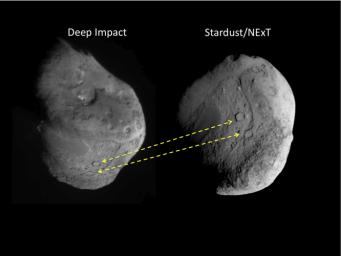
|
Tempel 1, as Seen by Two Spacecraft
- Click the image above for a larger view
- Full-Res JPEG (1489 x 1117) (88.6 kB)
- Full-Res TIFF (1489 x 1117) (5.0 MB)
Caption:
These two images show the different views of comet Tempel 1 seen by NASA's Deep Impact spacecraft (left) and NASA's Stardust spacecraft (right). Two craters, about 300 meters (1,000 feet) in diameter, help scientists locate the area hit by the impactor released by Deep Impact in July 2005. The dashed lines correlate the features.
Stardust approached the comet from a different angle on Feb. 14, 2011.
Background Info:
Stardust-NExT is a low-cost mission that will expand the investigation of comet Tempel 1 initiated by NASA's Deep Impact spacecraft. JPL, a division of the California Institute of Technology in Pasadena, manages Stardust-NExT for the NASA Science Mission Directorate, Washington, D.C. Joe Veverka of Cornell University, Ithaca, N.Y., is the mission's principal investigator. Lockheed Martin Space Systems, Denver, built the spacecraft and manages day-to-day mission operations.
For more information about Stardust-NExT, please visit http://stardustnext.jpl.nasa.gov .
Cataloging Keywords:
| Name | Value | Additional Values |
|---|---|---|
| Target | 9P/Tempel | |
| System | Periodic Comets | |
| Target Type | Comet | |
| Mission | Stardust | Deep Impact |
| Instrument Host | Stardust | Deep Impact |
| Host Type | Sample Return | Impactor |
| Instrument | Medium Resolution Instrument (MRI) | |
| Detector | ||
| Extra Keywords | Color, Crater, Dust, Impact | |
| Acquisition Date | ||
| Release Date | 2011-02-16 | |
| Date in Caption | 2011-02-14 | |
| Image Credit | NASA/JPL-Caltech/University of Maryland/Cornell | |
| Source | photojournal.jpl.nasa.gov/catalog/PIA13859 | |
| Identifier | PIA13859 | |
